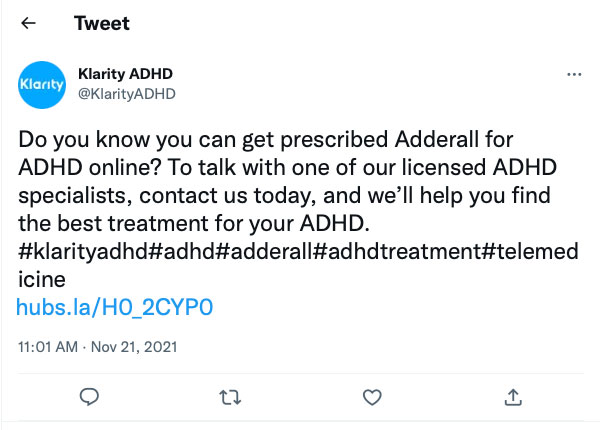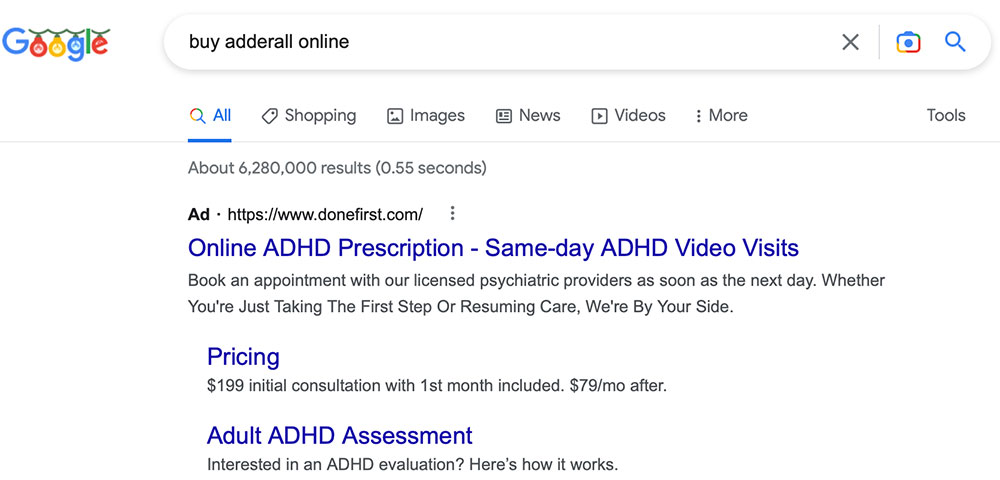Loopholes in the rules governing advertising for stimulant medications should be closed, according to a report released Monday by an international think tank.
Many telehealth companies have used advertising loopholes to aggressively market stimulant medications to users on social media without the typical disclosures found in pharmaceutical ads, according to the 39-page report by the Center for Data Innovation, which studies the intersection of data, technology, and public policy.
It explained that telehealth companies can post advertisements for prescription drugs without including any warnings or information about side effects due to technicalities in pharmaceutical advertising laws and regulations.
Many ads on social media for stimulant medication target an audience concerned about Attention Deficit and Hyperactivity Disorders. The Center for Data Innovation report referenced this November 2021 Tweet by Klarity ADHD:

Image source: Klarity ADHD Twitter feed
“Most medical providers who offer treatment for ADHD act in their patients’ best interests and prescribe stimulants when medically necessary,” said the author of the report Morgan Stevens.
“But some of the newer telehealth companies, such as Cerebral and Done, have abused the advertising loopholes to market stimulant medications,” she told TechNewsWorld.
Cerebral declined to comment for this story. Done did not respond to a request for comment before publication.
Pills Before People
In the past couple of decades, consumption of stimulant medication has surged, following a pattern similar to the opioid epidemic, the report explained.
Increases in the consumption of stimulant medications sustained during the Covid-19 pandemic, it continued, when some telehealth companies took advantage of loosened regulations to offer prescriptions for stimulants with little medical oversight or appropriate care.
However, despite increased consumption and availability of stimulant medications, stimulant misuse, and overprescription face less scrutiny than other Schedule II controlled substances, such as opioids, it added.
The report noted that a number of regulatory changes designed to foster the use of telehealth during the pandemic allowed for more remote services to be delivered than ever before, including prescribing stimulant medications.
In pursuit of rapid growth, it continued, some telehealth companies prioritized customer retention and satisfaction over ensuring that patients received appropriate, high-quality care.
The report maintained that some companies operating in the telehealth space have not met the standards of in-person psychiatric care.
The diagnostic process for ADHD typically involves a lengthy evaluation in which a medical provider will review a patient’s clinical history, discuss reported symptoms, and may ask for information from the patient’s friends and family, it explained. Instead, some companies evaluated patients during 30-minute appointments before reaching a diagnosis and prescribing stimulant medications.
‘Help-Seeking Ads’
Companies advertising ADHD medications were able to avoid more stringent rules by not mentioning specific drugs by name.
Unlike advertisements that name specific drugs, the report explained that these advertisements — classified by the FDA as “help-seeking ads” — discuss a condition or ailment but do not reference a specific medical treatment for it.
Instead, these ads will list symptoms caused by ADHD and encourage viewers to visit a medical professional for treatment if they experience the symptoms.

Dec. 5, 2022 — A Google search for “buy adderall online” returns a first result that is an advertisement for Done.
However, the report noted that many of the symptoms listed in the advertisements are common to the human condition and may not indicate that an individual has ADHD.
In relaying information about ADHD symptoms without providing additional context, these ads risk misleading viewers into thinking they have ADHD and should take medications to treat this condition without understanding the risks.
Viewers may identify with one or more of the common symptoms presented in the advertisement and seek out medical treatment for the condition, it added. This could result in some viewers receiving an inaccurate diagnosis and medically unnecessary treatment.
Law Enforcement Audits of Telehealth Platforms
Although some telehealth providers offering mental health services have likely played a role in the massive increase in stimulant medication prescriptions during the Covid-19 pandemic, the report urged policymakers to focus on improving oversight over those providers — and penalizing those violating the law — rather than seeking retribution for the telehealth industry overall.
Among the actions the report recommended policymakers take to identify bad or negligent actors responsible for unnecessary prescriptions is having law enforcement agencies regularly audit telehealth platforms.
However, Dr. Jeffrey Singer, a surgeon and senior fellow at the Cato Institute, a Washington, D.C. think tank, sees some problems with law enforcement assuming a role in regulating the medical profession.
“I don’t know too many law enforcement people who have medical or pharmacological degrees, but they seem to be deciding what is overprescribing and what isn’t,” he told TechNewsWorld.
“Whether doctors are overprescribing, underprescribing or inappropriately prescribing is a medical decision, not a decision for the criminal legal system,” he added.
In a white paper published in November, Singer and Cato Research Fellow Trevor Burrus argued that the medical mismanagement of pain, which causes harm to patients, is best addressed through the civil tort system.
“[S]tates establish professional licensing boards specifically to enforce the ‘standard of care’ rendered by the professionals they oversee,” they wrote. “Law enforcement has no medical expertise and should have no say in classifying narcotics and psychoactive substances.”
Doctors Crossing State Lines
Stevens countered that the Drug Enforcement Administration, Department of Health and Human Services, and state law enforcement agencies already investigate practitioners and organizations in the health care industry, in addition to the DEA conducting routine audits for controlled substances.
“The DEA, HHS, and states have the capabilities to expand upon these operations to ensure greater controlled substances compliance,” she added.
The report also recommended that practitioners be allowed to treat patients across state lines. It recommended that policymakers expand the number of providers that patients can see to receive mental health services. With telehealth, patients can receive remote medical care from providers in different locations.
It added that state policymakers should join licensing compacts that enable medical providers to practice across state lines.
In testimony before Congress, Singer suggested lawmakers go even further. “Congress should define the ‘locus of care’ as the state in which the practitioner is located as opposed to the state in which the consumer of the service resides,” he told the Senate Subcommittee on Communications, Media, and Broadband.
“This change would increase access to care and allow patients to utilize expertise that may exist in areas of the country otherwise beyond their reach,” he explained. “It would also remove the protection from out-of-state competitors that health care providers otherwise enjoy. The increased competition would redound to the benefit of patients.”
Keep Watchful Eyes on Telehealth Providers
The report noted that regulatory changes from the Covid-19 pandemic led to the development of a telehealth startup economy. These new companies enabled patients to receive medical care from the comfort of their homes and provided medical benefits that would have otherwise been unavailable. Still, some telehealth providers have exploited these changes to the detriment of patients.
Given telehealth’s benefits and ease of access, it continued, policymakers should continue the regulatory changes that allowed companies to flourish. However, they should work to ensure that remote patients receive the same standard of care as they would during in-person appointments.


























































Social Media
See all Social Media